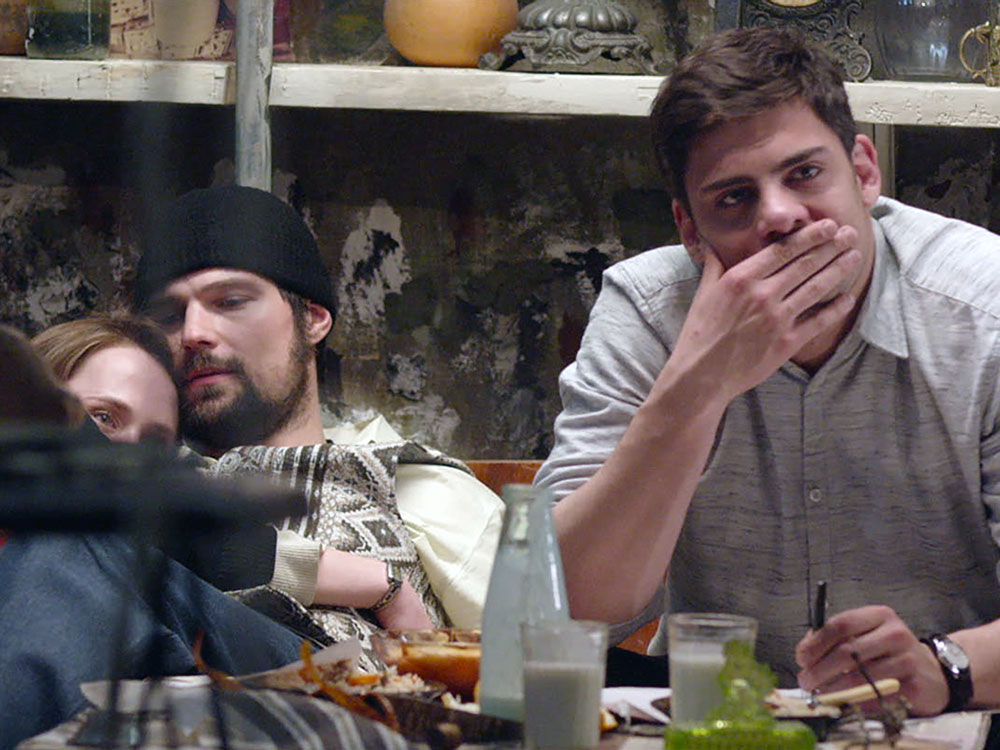Occidente (France/Portugal, 2014, 15’)
Film Session 1: Departing from Brasília
“I will begin at the beginning”, Euripides, Medea. The sentence is the first to appear in Vaz’s first film, Sacris Pulso (2008). This is a short film centred on the phantasmatic aspect of her hometown Brasília, a city that was to be re-addressed in many of her subsequent films, such as The Age of Stone (2013) and Apiyemiyekî? (2019). Much of her cinema derives from the influence Brazil’s capital city has had on her view of the world, as Brasília encompasses contradictions that resonate.
The screening will be followed by an in-person Q&A with Ana Vaz.
Sacris Pulso (Brazil, 2008, 15’)
In open dialogue with Sérgio Basi’s and Zuleika Porto’s Brasiliários (1985), a film that revisited writer Clarice Lispector’s unique view of Brasília as a ruin of the future, Vaz made her debut film. Studying film in Melbourne at the time, she mixes the material with 8mm found footage portraying an Australian family in rituals of travel and domestic moments. The outcome is a distinctive blend of personal memory and science fiction.
The Age of Stone (Brazil/France, 2013, 29’)
One of Vaz’s most astonishing works, The Age of Stone reinvents Brasília as a CGI monument in the middle of the savannah. Through a speculative look, she challenges the origins of the city while depicting its final collapse. The false monument designed by French sculptress Anne-Charlotte Yver embodies that contradiction, with fauna, flora and human presence in the surroundings. Vaz resorts to extracts from writers Clarice Lispector, Hilda Hilst and Machado de Assis as companions in that journey into the far west of Brazil.
Apiyemiyekî? (Brazil/France/Netherlands/Portugal, 2019, 29’)
A major symbol of violence and oppression, Brasília features in the opening sequence of this profoundly delicate film about the horrors of the Brazilian military dictatorship (1964-1985). Focusing on Brazilian educator and indigenous rights militant Egydio Schwade’s archive, Apiyemiyekî? allows access to the 3.000 drawings made by the Waimiri-Atroari people, based in the Amazon region, during their first literacy process decades earlier. Apart from commenting on their collective perspective, the drawings refer to the genocide suffered by the indigenous group.
Film Session 2: Colonialism and Global Extractivism
This session reunites works which explore the marks of colonialism and extractivism in the world we live in - and how that imbrication has shaped Vaz’s cinema. With a camera-arrow in Amérika (2016) and a camera-predator in There Is Land! (2016), or crossing the Atlantic to Lisbon in Occidente (2014) and reaching the Nord-Pas-de-Calais in Look Closely at the Mountains (2018), Vaz touches on the implications of the failed modern projects and their lingering in the present.
Amérika: Bay of Arrows (Dominican Republic, 2016, 9’)
In 1492, it is said that the Caribbean Tainó people received European Christopher Columbus’s men with a rain of arrows. The foundational moment of colonialism in the Americas is addressed by Vaz with her camera-arrow. She revisits the Dominican Republic territory not only to reflect on the past but to target the eco-systemic changes that are impacting a saline lake named after the Tainó chief Enriquillo.
There is Land! (Brazil/France, 2016, 13’)
Collaborating again with Ivonete dos Santos Moraes, a luminous presence in The Age of Stone, Vaz sets new rules here. While the voice of a man echoing from the colonial past shouts “There is land!”, one hears the words of a young girl in an intimate testimony in the present. The camera seems a predator to the girl, as it is to the territory she inhabits. But is she safe in her territory as she is to the camera?
Occidente (France/Portugal, 2014, 15’)
Interested in investigating the commodification of colonial history, the director sheds light on exotic birds that have become luxury items, antiques as reproducible dinner sets, and monuments that are now geodata. In Occidente, a group of friends enjoys themselves eating feijoada, the Brazilian dish par excellence while being served by a Brazilian maid. A film poem about power, objects, and imagery.
Look Closely at the Mountains (Brazil/France, 2018, 30’)
Vaz draws a parallel between the mining activities in the State of Minas Gerais, in Brazil, and in the Nord-Pas-de-Calais, in France. If the first sees their eroded mountains as ghosts and still faces serious extractivist damages in the present, the second turns itself to identifying, classifying and mystifying the traces left in the anthropic landscape. “Look closely at the mountains!” is an imperative created by Manfredo de Souzanetto, a Brazilian artist who challenged the military dictatorship back in the 1980s by protesting against what mining activities were causing to the environment.
“I will begin at the beginning”, Euripides, Medea. The sentence is the first to appear in Vaz’s first film, Sacris Pulso (2008). This is a short film centred on the phantasmatic aspect of her hometown Brasília, a city that was to be re-addressed in many of her subsequent films, such as The Age of Stone (2013) and Apiyemiyekî? (2019). Much of her cinema derives from the influence Brazil’s capital city has had on her view of the world, as Brasília encompasses contradictions that resonate.
The screening will be followed by an in-person Q&A with Ana Vaz.
Sacris Pulso (Brazil, 2008, 15’)
In open dialogue with Sérgio Basi’s and Zuleika Porto’s Brasiliários (1985), a film that revisited writer Clarice Lispector’s unique view of Brasília as a ruin of the future, Vaz made her debut film. Studying film in Melbourne at the time, she mixes the material with 8mm found footage portraying an Australian family in rituals of travel and domestic moments. The outcome is a distinctive blend of personal memory and science fiction.
The Age of Stone (Brazil/France, 2013, 29’)
One of Vaz’s most astonishing works, The Age of Stone reinvents Brasília as a CGI monument in the middle of the savannah. Through a speculative look, she challenges the origins of the city while depicting its final collapse. The false monument designed by French sculptress Anne-Charlotte Yver embodies that contradiction, with fauna, flora and human presence in the surroundings. Vaz resorts to extracts from writers Clarice Lispector, Hilda Hilst and Machado de Assis as companions in that journey into the far west of Brazil.
Apiyemiyekî? (Brazil/France/Netherlands/Portugal, 2019, 29’)
A major symbol of violence and oppression, Brasília features in the opening sequence of this profoundly delicate film about the horrors of the Brazilian military dictatorship (1964-1985). Focusing on Brazilian educator and indigenous rights militant Egydio Schwade’s archive, Apiyemiyekî? allows access to the 3.000 drawings made by the Waimiri-Atroari people, based in the Amazon region, during their first literacy process decades earlier. Apart from commenting on their collective perspective, the drawings refer to the genocide suffered by the indigenous group.
Film Session 2: Colonialism and Global Extractivism
This session reunites works which explore the marks of colonialism and extractivism in the world we live in - and how that imbrication has shaped Vaz’s cinema. With a camera-arrow in Amérika (2016) and a camera-predator in There Is Land! (2016), or crossing the Atlantic to Lisbon in Occidente (2014) and reaching the Nord-Pas-de-Calais in Look Closely at the Mountains (2018), Vaz touches on the implications of the failed modern projects and their lingering in the present.
Amérika: Bay of Arrows (Dominican Republic, 2016, 9’)
In 1492, it is said that the Caribbean Tainó people received European Christopher Columbus’s men with a rain of arrows. The foundational moment of colonialism in the Americas is addressed by Vaz with her camera-arrow. She revisits the Dominican Republic territory not only to reflect on the past but to target the eco-systemic changes that are impacting a saline lake named after the Tainó chief Enriquillo.
There is Land! (Brazil/France, 2016, 13’)
Collaborating again with Ivonete dos Santos Moraes, a luminous presence in The Age of Stone, Vaz sets new rules here. While the voice of a man echoing from the colonial past shouts “There is land!”, one hears the words of a young girl in an intimate testimony in the present. The camera seems a predator to the girl, as it is to the territory she inhabits. But is she safe in her territory as she is to the camera?
Occidente (France/Portugal, 2014, 15’)
Interested in investigating the commodification of colonial history, the director sheds light on exotic birds that have become luxury items, antiques as reproducible dinner sets, and monuments that are now geodata. In Occidente, a group of friends enjoys themselves eating feijoada, the Brazilian dish par excellence while being served by a Brazilian maid. A film poem about power, objects, and imagery.
Look Closely at the Mountains (Brazil/France, 2018, 30’)
Vaz draws a parallel between the mining activities in the State of Minas Gerais, in Brazil, and in the Nord-Pas-de-Calais, in France. If the first sees their eroded mountains as ghosts and still faces serious extractivist damages in the present, the second turns itself to identifying, classifying and mystifying the traces left in the anthropic landscape. “Look closely at the mountains!” is an imperative created by Manfredo de Souzanetto, a Brazilian artist who challenged the military dictatorship back in the 1980s by protesting against what mining activities were causing to the environment.
08:45 pm
Fri, 26 Sep 2025
Cinema 1
Ticket information
- All tickets that do not require ID (full price, disabled, income support) can be printed at home or stored in email
- For aged-based concession tickets (under 25, student) please bring relevant ID to collect at the front desk before the event.
Access information
Cinema 1
- Both our Cinemas have step free access from The Mall and are accessible by ramp
- We have 1 wheelchair allocated space with a seat for a companion
- All seats are hard back, have a crushed velvet feel and they do not recline
- These are our seat size dimensions: W 42 x D 45 x H 52
- Arm rest either side of the seat dimensions: L 27 x W 7 x H 20
for the following requirements:
- We have unassigned seating. If you require a specific seat, please reserve this in advance
- Free for visitors where ticket prices are a barrier, please email
All films are ad-free and 18+ unless otherwise stated, and start with a 10 min. curated selection of trailers.
Members+ and all Patrons gain free entry to all cinema screenings, exhibitions, talks, and more.
Join today as a Member+ for £25/month.











no. 236848.